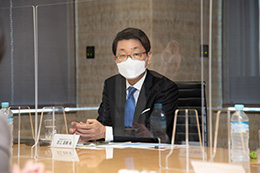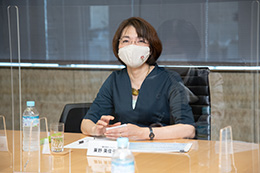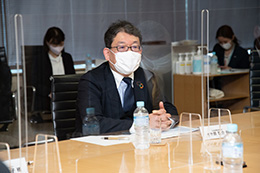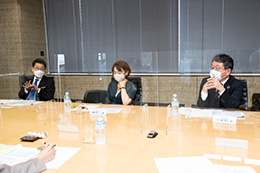Along with the climate change, loss of biodiversity is becoming increasingly important issue to the sustainability of the planet. The Suntory Group has been addressing biodiversity issues through Bird Conservation Activities and water resource cultivation in Natural Water Sanctuaries. However, we need to step up our efforts now more than ever. We therefore asked experts to give us their opinions from a wide range of perspectives on future policies, on how to proceed with initiatives, and on communication with the stakeholders.
-
● Date:Monday, March 14, 2022
-
● Location:Suntory World Headquarters (Tokyo, Japan)
Experts
-
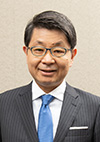
Naoki Adachi, PhD
CEO, Response Ability, Inc. -

Mikako Awano
Founder, CEO, SusCon Japan -

Keisuke Takegahara
Executive Fellow, Research Institute of Capital Formation, Development Bank of Japan Inc.
Suntory
-

Makiko Ono
Managing Executive Officer, Division COO, Sustainability Management Division
Suntory Holdings Limited -

Masaaki Fujiwara
Executive Officer, Deputy Division COO, Sustainability Management Division
Suntory Holdings Limited -
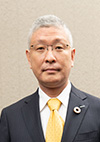
Shigeaki Kazama
Executive Officer, Deputy Division COO, Sustainability Management Division
Suntory Holdings Limited -

Nobuyasu Kitamura
Senior General Manager, Corporate Sustainability Department, Sustainability Management Division
Suntory Holdings Limited -

Masao Itoko
Managing Executive Officer, Division COO, Supply Chain Division
Suntory Holdings Limited -

Kazushi Ishikawa
Managing Executive Officer, Division COO, Corporate Strategy Division
Suntory Beverage & Food Limited
Moderator
Hidenori Imazu
Program Committee Member, Japan Forum of Business and Society
For Effective Internal and External Communications, Present the Overall Structure of the Multi-layered Strategies
- Moderator
- Today, we would like to hear various opinions from experts in order to further promote activities and communications related to biodiversity. First of all, please give us your impressions of the Suntory Group’s biodiversity initiatives.
- Adachi
- The world is now moving toward a nature-positive world. Suntory’s corporate mission, "To Create Harmony with People and Nature," represents a way of thinking that is wholly consistent with a nature-positive world. People cannot live without nature. The world has finally begun to move toward a society in which we aspire to enable nature and people to coexist. I think it is wonderful that Suntory formulated the Suntory Group’s Environmental Principles in 2015 which is aware of nature-positive world, and that it has proposed revisions in keeping with the times.
It is also excellent that Suntory is thoroughly committed to the "Mizu To Ikiru (living with water) " concept. Water is Suntory’s most critical resource. It is rather rare for a Japanese company to have such a global perspective, conducting water resource cultivation and next-generation environmental program, Suntory Mizuiku - Education Program for Nature and Water beyond Japan as well. I think that the peatland regeneration (efforts to protect whisky production in Scotland through peatland and water resource conservation) is also a highly laudable activity and hope it would be widely communicated. Futhermore, I would like to ask you to extend these considerations to other raw ingredients as well, not completing with just water.
- Awano
- It struck me very much to see how Suntory is analyzing biodiversity from such a multiple viewpoint given the long history of initiatives on environmental issues that Suntory has undertaken since its founding. It is so rare for a Japanese company to advance initiatives to this extent. Environmental issues, however, are complex and interconnected. When you launch a climate change strategy while also launching a biodiversity strategy, you encounter same issues respectively. There is a risk of losing sight of how to ensure such complex nexus when incorporating these elements into activities based on the strategy.
I think it will make things far easier to understand if you present an overall structure to show the position of each strategy and how they all interact and interconnect with each other, rather than just explaining by words. This will not only facilitate the understanding of external stakeholders but also enable employees to more easily grasp overall structure of your strategies. I strongly anticipate that you’ll take further easy-to-understand way of communicating Suntory’s comprehensive approach.
- Takegahara
- Whether a company is listed or unlisted, the current discussion in the world of finance is about the need to properly identify factors and make choices for the firm’s long-term growth. In doing so, it is essential to look at various non-financial information as well, because this discernment is impossible only by looking at current financial performance. In determining what non-financial information to look at, materiality comes under active discussion. The idea is to measure those factors that affect the long-term growth of the company or the sustainability of its business model over the long term as material information. A company that can explain this axis will be able to depict itself as a company with ability to grow while solving social issues, so to speak. Therefore, such a firm is seen worthy of long-term investment.
Suntory has firmly positioned natural capital, climate change, and water among the materialities that are foundational to its business, in the same sense as compliance and corporate governance. I think this is Suntory’s most distinctive and commendable characteristic.
This is a bit of a departure from biodiversity, but another theme is how to present human capital in the debate over the government’s "new capitalism”. Human capital is difficult to be explained quantitatively, and I think it ultimately depends on whether the practice of purpose-driven management is enabling purpose to permeate the workforce and increase employee engagement. The "Mizu To Ikiru" message is spoken by everyone as something that applies to them personally, even junior employees. Purpose resonates with employees, which fosters an eagerness to work toward its realization. I think this provides sufficient material for the formation of Suntory’s intangible enterprise value, value as viewed from the perspective of human capital.
- Adachi
- Speaking of biodiversity, the most crucial perspective is whether the business can continue for 10 years, 20 years and beyond. The current world population is 7.7 to 7.8 billion. In 10 to 20 years, when the population reaches 9 or 10 billion, more food will be needed especially in emerging countries.
The market will grow by 25% to 30%, and in order to secure a stable supply of raw ingredients to support that growth, it will be critical to provide various supports for those who are producing raw ingredients upstream in the value chain. This will not be possible unless such local workers lead healthy and stable lives, working enthusiastically to produce the raw ingredients. To this end, it will not be possible to produce raw ingredients without shifting to an appropriate agricultural environment.
I think that for Suntory, maintaining the perspective of how to do business together with people involved in every step throughout the value chain will affect how they develop their business moving forward, and at the same time keep their business secure.
Be Engaged in Building Trust and Relationship with the Value Chain Stakeholders
- Moderator
- At the Suntory Group, the entirety of the value chain is included within the scope of the Suntory Group’s Environmental Principles because Suntory pledges to hand over a sustainable society abounding in vibrant life to the next generation. What kind of initiatives involving the value chain are you working on in your actual business?
- Fujiwara
- When we consider Suntory’s history, quality is what has been given prime importance in manufacturing. Another crucial aspect has been traceability. Take oolong tea beverage, for example, which has grown significantly as a business over the decades. In bringing this product to market, we traced back to the origins of the oolong tea leaves value chain. At the time, pesticides posed a risk, and we decided that we needed to go back to the farms where the production was taking place to clear that up, so we have invested in this effort. Our focus at the time was on product quality. But now I have further understood the importance to have the perspective of creating a flow that will enable everyone involved in the value chain to lead an upstanding life.
- Itoko
- For coffee, we have been working in firm partnership with Brazilian farms for the past five to six years and have been promoting contract farming. We are also building schools in Guatemala to create educational opportunities and to teach sustainable cultivation methods. This is something we undertake because we believe it to be necessary, but expanding it is very difficult, and I have experienced a real sense of how difficult it is to continue doing this. Nevertheless, we are not going to sell off or cut out the operation related to this just from the profitability point of view. You cannot build trust with producers unless you engage with them for a long time.
- Adachi
- I think building trust is very important. I think it is important to build trust with the people in the production sites, and to find ways of increasing the number of farmers who feel sympathy and consider themselves to be producing for Suntory, or for Mr. Itoko.
- Fujiwara
- It takes a lot of determination to get into the entire value chain. Meanwhile, customers’ tastes and preferences will also change over time. With coffee, for example, plantations may be changed to suit different tastes. How to build relationships with the value chain then poses a major challenge. This is true for all raw ingredients, but I feel that we must consider ways of building trust with these plantations and producing regions, keeping resolutely aware that they are indispensable to continuing our business to the future. We have formed a global cross-functional team that has begun its work, and would like to further deepen our deliberations of these matters.
- Itoko
- In the future, I think debates will emerge regarding things like drastic increases in production of genetically modified organisms (GMOs) to cope with the increase in the world’s population. What is the global situation on this issue?
- Awano
- Japanese consumers have high allergic reactions to GMOs, but globally they are widely adopted in reality. Given the strategies for sustainability, GMOs should or could not be avoided as a taboo in the future in your cosideration. Our priority issues will be how to increase yields without new land conversion to agriculture, and how to maintain yields despite the impact of climate change.
- Adachi
- It is very controversial and the thoughts diverge by region. I believe we should be as safety-minded as possible, and avoid being too quick to latch onto GMOs alone. Still, the current intensive agriculture in the arid environments of Europe and North America is apparently at its limit. The use of large amounts of pesticides and chemical fertilizers is also deteriorating the soil, making farming almost impossible. Organic and regenerative agricultures are intended to help maintain or even recover productivity by regenerating this soil. While I am not sure whether this will provide a panacea, I think a need for it is emerging in the field.
- Ono
- In Europe, organics are familiar to consumers. I think the consumer’s perspective is that they buy organic items on the assumption that there is some health benefit, even if they are more or less expensive. From the standpoint of biodiversity, this kind of consumer behavior is connected to sustainable agriculture, although consumers are not made aware of this. One challenge is how to communicate to consumers that what they understand to be good for their health is also good for biodiversity.
- Adachi
- With respect to the future increase in the world’s population to 1.2 times its current size, will Suntory increase its sales by 1.2 times, or even more? Or, will it take an approach by which it can be sustained without expanding the scale of business, keeping it at a level that can be reliably maintained? As there might be various strategies and options, I think we need to give this thorough consideration.
- Takegahara
- If you think of a bottleneck in the procurement of raw ingredients in terms of business continuity plan, a so-called "BCP," you would normally adopt an alternative strategy or diversification strategy to eliminate that bottleneck. Now, however, due to population growth and other factors, raw material supply has become a bottleneck on a global scale, and it is necessary to address issues for which alternative strategies are not effective. When this happens, we have no choice but to move on to the product portfolio. I think we are being asked a message about a business model that adopts the new constraints.
Look into the Nature Related Opportunities as well as Risks for Increasing the Enterprise Value
- Moderator
- What kind of discussions are going on in Japan and abroad regarding biodiversity initiatives?
- Takegahara
- The International Sustainability Standards Board (ISSB) has issued a draft disclosure standard that can be considered a sustainability information version of the International Accounting Standards. In the draft, materiality is limited to financial materiality, that is, information that affects enterprise value. Since various issues affect each other and affect enterprise value in a comprehensive manner, there is concern that simply arranging topics such as climate change and biodiversity as material issues will make it difficult to convey that point.
In addition, with the spread of the Task Force on Climate-related Financial Disclosures (TCFD), many companies have already set out climate change as a “material issue" that affects their growth. Financial interest is heading towards the materiality that follows. Natural capital is a prospective candidate along with the circular economy, but the current situation is that it is difficult to link natural capital to growth strategies.
- Ishikawa
- I myself belong to Suntory Beverage & Food Ltd., the only listed company in the group, and I believe that the mission of a listed company comes down to how to raise its enterprise value. In this context, the shift from financial to non-financial information has moved forward with the Taskforce on Climate-related Financial Disclosures (TCFD) framework leading the way in the immediate future, and movement occurring toward the Taskforce on Nature-related Financial Disclosures (TNFD). Since it is impossible to ensure accountability to all stakeholders with a single materiality, we must proceed with combinations of double materiality and even dynamic materiality. I feel that converting this into practical operations poses a difficult issue.
- Awano
- From the standpoint of enterprise value, I think showing how biodiversity strategy is relevant to the increase of enterprise value will be a major pillar in the future. However, when we look at the biodiversity strategies of many companies, we see a tendency to emphasize risk side, and a weaker focus on opportunity side. Narrative of opportunities are required for increasing enterprise values.
- Ishikawa
- From the perspective of improving enterprise value, it’s necessary to reveal opportunity as well as risk. I would like for us to think carefully about how to express our opportunity.
- Awano
- With respect to water, on the other hand, when we take a multi-stakeholder approach globally, the relationship with local communities is naturally indispensable. I believe that a major feature of future operations will be looking at how biodiversity strategies, including such relationships, can lead to improved enterprise value on a global basis. It will then be important to be mindful of the fact that local issues cannot be globalized so easily. This is a characteristic of natural capital that makes it different from climate change. In doing so, I think that multi-stakeholder engagement that incorporates and reflects the opinions of local communities will be necessary. Otherwise, the activity will simply end up as self-righteous social philanthropy by the company.
- Kazama
- As for expanding water resource cultivation globally, of which there are examples of success in Japan, I have some experience working overseas, and understand the difficulties on the practical level. Nevertheless, we must proceed. The year before last, we began a pilot program in high water risk regions overseas. There are aspects that have gradually become evident to us through these efforts.
Specifically, we have found a university professor in Indonesia who is knowledgeable about water, and we are proceeding with the project by incorporating local know-how learned from the professor. In Spain, our operations use city water because, unlike Japan and Indonesia, this is an arid region where there are no wells at production plants. We are borrowing from local wisdom of how to cultivate water resources in such an environment. Rather than simple water resource conservation, we are proceeding with the project in the context of how to communicate with the local community and how to preserve the city water of the local municipality.
- Kitamura
- The Suntory Group is working on sorting out issues concerning primary suppliers comprehensively by utilizing the Supplier Ethical Data Exchange (Sedex), an international platform for supply chain issues. We are aware, however, that ultimately we have to go to the farmers. However, even for a single coffee, for example, the themes are so multilayered and intertwined that we feel difficulty in trying to figure out how we should bring things to a resolution of the problem. What kind of aspects should we consider when actually proceeding with the project?
- Awano
- I think it is very difficult even for companies that are making progress with their initiatives. With regard to biodiversity, financial institutions and business firms were perplexed to find a way to start in the first place. There is a common perception that it’s so complicated that they don’t know where to start. So, in TNFD, it started from showing where to set to work. It has a practical guide, which I think makes it easier to get a handle on it and structurize concepts. I hope you will give it a try.
- Adachi
- One reason for the difficulty in understanding biodiversity is its complexity, but I think another reason is probably the lack of our experience to see the fields. Locality is critical for issues of biodiversity or raw ingredients. Although not so much as in the case of wine, it often happens that circumstances differ greatly with just a few kilometers of separation. Therefore, the first necessary task is to connect local sites involved. In Japan, this has been done by trading companies. But in the future, manufacturers themselves need to go and see the places where the raw ingredients they use come from. However, some issues can be discerned only by experts. This is the reason why some companies make site visits with local agricultural advisors or NGO staff, or train perceptive observers within the company or even hire people with such expertise.
In addition to going into the field by yourself, I also would like to propose to consider having people working in the field come to visit Suntory in the future. Because I believe it is important to create a system that allows for a bottom-up creative approach from the field as people learn more about Suntory’s initiatives and gain a deeper understanding. This is about developing a system in which everyone can support each other with an optimal sense of unity with Suntory throughout the entire value chain, making it possible to work successfully together. This is no easy task, but looking at the efforts of global companies, I believe that over a period of time, say 10 years, considerable progress can be made.
- Kitamura
- We have to work as a team both inside and outside the company to solve the multi-layered challenges of biodiversity. Internally, I would like to deepen the discussion, including questions of what perspective to take and by when to implement the plan, as we draw on wisdom from various angles by involving the business divisions.
Envision What Suntory Aims to Be in 50 Years
- Moderator
- We’ve received a wide range of advice from the experts. To conclude, could you please give us your message of support for Suntory?
- Takegahara
- The discussion has touched on biodiversity being complex and difficult to understand, but in fact, looking at Suntory from the outside, I think Suntory may show that it is not actually difficult to grasp issues in an integrated manner and to link them to its efforts.
Also, I am very eager to see your future product portfolio. I understand your attitude not to sell your business easily just because you are facing challenges. The portfolio selected in the management stance will probably be something unique to Suntory. I think that will probably lead to opportunities.
- Awano
- I noted that efforts to improve enterprise value tend to emphasize risk over opportunity. However, the reality is that a global awareness of risk and a sense of urgency are extremely strong. Many companies are just now getting started, and finally recognizing what difficulties biodiversity poses. Among them, Suntory is set on the starting line, ready and waiting for the signal to begin. That is your strength, and we hope that you will get off to a good start by taking advantage of everything that you have built up.
- Adachi
- In the approach to biodiversity recovery, efforts are to be taken in a particular order. First comes risk avoidance, then risk mitigation. Thus far, Japanese companies have managed to accomplish these. Beyond that, however, there has been little movement on restoration and regeneration. What will be important in the future is restoration and regeneration. Suntory is already moving forward with work on restoration and regeneration of water and peatlands. What I would like you to consider further is the change, the transformation, that lies beyond restoration and regeneration.
There are many kinds of transformation, and one of these is transforming the way business is conducted. That is, I think there will be a transformation from buying raw ingredients from trading companies to going into the fields yourselves, looking the fields over closely, or even doing the work together. Another is to think transformation of the business model itself. I believe that all industries now seem to be shifting away from the era of mass production and mass sales. I think there might be another way of doing things at Suntory as well.
When it comes to the culture on which Suntory places great value, food culture differs from region to region, and that is where value lies. Considering this, I believe it might be good to place more emphasis on local cultures of food and beverages. I assume and hope that such products will become a big pillar of the company in the future.
- Ono
- We have received many comments and suggestions on biodiversity, and now I would like to share three points by way of summary.
The first point is to view raw ingredients throughout the entire value chain. We have already started working on it, but we are just getting started. In terms of how to take concrete actions in the future, we need to think about how we can build win-win relationships by going into the field and partnering with local people in a more accessible way. By doing so, we will deepen our understanding, and local suppliers will also improve their level of quality. I felt that such activities should then be linked to the improvement of human capital skills to have a positive impact within the company.
The second point is about enterprise value. Our consideration started from considering how to avoid risk, but taking a step further, how to take Suntory’s enterprise value into the positive is also important. We tend to think from the perspective of risk, but we need to consider how we can shift to an opportunity-oriented perspective.
The third point is what kind of business Suntory will be doing 30, 40, or 50 years from now. It is obvious that we cannot make progress along a linear extension from the present. So I felt that we need to use our imaginations while working on the tasks immediately before us, thinking about how we want things to be and what is necessary to achieve that. It is a difficult perspective to get a handle on, but I intend for us to work on it as part of our mission. Thank you very much for your time today.
